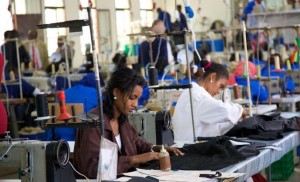Addis Ababa, 6 January 2015 (WIC) – Almost all of Ethiopian regional states have finalized their Diaspora housing program directives and are preparing to start the housing program registration.
Representatives from the regional state Diaspora offices with Ministry of Foreign Affairs Diaspora Engagement Affairs General Directorate held a meeting on the Diaspora housing development program progress review on December 12, 2014 at the Ministry of Foreign Affairs (MoFA).Progress on the preparation of directives by the regional states, finalization and standardization of the program were the meeting agenda, according to Feisel Ali, Diaspora Engagement Affairs General Directorate director.
The regions shared experiences on the issues and drew important ideas to incorporate to their directives from the meeting, stated Abreham Gebremedhin, Tigray Diaspora Coordination Office head.Model registration procedures are sent from the Ministry’s Diaspora Directorate to all the regions, which the regions adopt based on their region’s area, land lease price, standards of urban areas where construction will take place and construction cost, explained Fiesel.
Almost all regional states have completed their directives, except Harari, Benishangul Gumuz and Afar, said Fiesel.In Addis Ababa only, apartment houses are planned to be built, according to Addis Ababa’s Diaspora Housing Development Directive. The apartments can be a G+4 or above but if the construction is taking place in the central zone of the city only a G+12 and above apartment building are allowed, according to Tesfa Bisrat, head of Diaspora Coordinating Desk with the rank of assistant advisor to the mayor.The apartments will be built in group that contains either 12 or 24 members and 50sqm of land is allocated for each member for the house, stated Tesfa.
The Tigray regional state completed and approved its Diaspora housing directives in June 2014, according to Atakilt Gebreyhiwot, Tigray Urban Development, Trade and Industry Bureau director. We have outlined an initial directive on how to proceed with the housing program but the directives can be improvised based on the interests of the house buyers as well as important guidelines we would like to include in the directive, stated Atakilt.
Tigray has planned to include apartment housing with two floors or above in all parts of the region, he said. The houses can be two, three or four bedrooms houses, according to the directives. The two bedrooms house will rest on 60sqm-80sqm with the price tag of 424,390Br. The three-bedroom house will cost 573,500Br and rests on 80sqm-100sqm. The four-bedroom house will rest on 100sqm-136sqm with the cost of 779,960Br.
Another region, which has already completed its Diaspora housing directives, is the Oromia region. The region has included in its directives an apartment as well as town housing program, according to Bayissa Hirko, Oromia Industry and Urban Development Bureau, senior expert of housing transfer and administration.
The apartment will be G+4 or above, having two, three or four bedroom houses, he added. The two-bedroom house will rest on 80sqm land and costs 400,000Br, where as the three-bedroom will cost 550,000Br and rests on 100sqm land; the four bedrooms will be built on 110sqm land and will cost 700,000Br. The town houses will have a G+1 and G+2 format and will be built on 120sqm and will cost 500,000Br and 800,000Br respectively, explained Bayissa.
The Southern Nations, Nationalities & Peoples’ Region (SNNPR) has categorized its urban areas in different levels, with Hawassa as a leading city. The rest are categorized as high-level, mid-level, town and developing towns, according to Aschalew Kassaye, SNNPR Industry and Urban Development Bureau, housing development and administration. The distinction was made based on population number, area, economy and service provision of the towns, explained Aschalew.
An apartment and a town house are to be built in the region, according to the directive. Only G+4 and above apartment houses will be built in Hawassa with two, three or four bedrooms which rest on 50sqm, 65sqm, and 80sqm respectively while a G+3 apartment will be built in high-level towns. The apartment houses can be two, three and four bedrooms, which will rest on 55sqm, 70sqm and 85sqm of land, respectively. Only G+1 and G+2 town houses can be built in mid-level towns that have two, three or four bedrooms and built on 60sqm, 75sqm, and 90sqm, accordingly. For the developing towns only the construction of a single storey town house construction is allowed, stated Aschalew. It will have two, three or four bedrooms, which rest on 65sqm, 80sqm and 90sqm of land respectively. But cost decisions will not be finalized until January 9, 2015, he added.
Dire Dawa has only planned the construction of G+2 and G+3 town houses, according to Sebsibe Mekonnen, the city’s Diaspora affairs coordinator. The houses will have two, three and four bedrooms, which rest on 128sqm, 160sqmand 200sqm, respectively, with 582,400Br, 728,000Br, and 910,000Br cost.
The payment will be made in hard currency, 50pc upon registration and the rest when construction begins, according to Feisel. An Ethiopian Diaspora who has never owned a house by his name or through his relatives can register for the program. It is possible to register collectively forming 12-24 members, stated Fiesel. The home buyers can come up with their own design but as for hiring a contractor of their choice, some regions’ directive compels them to hire only government contractor.
The directives are a work-in-progress, which could be modified based on the discussion, stated Sebsibe. We are trying to come up with standardized and similar directives and most of the directives reflect this, stated Fiesel. The directives, which are collected from the regional Diaspora offices, have been distributed to Ethiopian embassies. When all the regions complete the preparation, then we can proceed to the registration phase as we are now completing the work plan schedule, added Feisel. (Addis fortune)

